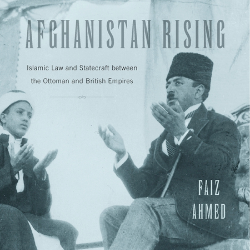
August 19, 2019 will mark the 100th anniversary of Afghanistan’s independence from Britain. Commemorating the roots and legacies of that watershed event, Faiz Ahmed will present a vibrant account of the first Muslim-majority country to form a fully sovereign government, ratify a constitution, and promulgate an original body of national laws after the fall of the Ottoman Empire. Debunking conventional narratives of Afghanistan as a perennial war zone and remote frontier, Faiz Ahmed's book Afghanistan Rising (Harvard University Press, 2017) rediscovers a time when Kabul stood proudly as a center of constitutional politics and contested visions of reform in the greater Islamicate world.
Faiz Ahmed is Associate Professor of History at Brown University. He specializes in legal and constitutional history in the Ottoman Empire, Middle East, and South-Central Asia, as well as diasporic communities connected to these regions. His first book, Afghanistan Rising: Islamic Law and Statecraft between the Ottoman and British Empires, was published with Harvard University Press in November 2017, which won the American Historical Association's 2018 John F. Richards Prize in South Asian history. Afghanistan Rising shows how debates today on Islam, governance, and the rule of law have deep roots in a beleaguered land.
“A groundbreaking book that will reorient the way we think about not only Afghan modernity, but also political and legal thought in Muslim societies during the twentieth century. Ahmed describes the emergence of a modern Islamicate region during the age of imperial globalization and demonstrates the appeal of multiple governance models in the ideas exchanged within this region among different Muslim publics. More importantly, he shows how Afghan kings experimented with novel legal and political models to assert their legitimacy while establishing on the global stage Afghanistan’s sovereignty as a modern nation state. The book persuasively shows us how Afghanistan’s transformation exemplifies a model of Muslim modernity that was not Eurocentric.” —Cemil Aydin, author of The Idea of the Muslim World: A Global Intellectual History
co-sponsored by the Global Humanities Initiative and the MENA Program
Cost: Free and open to the public
Audience
- Faculty/Staff
- Student
- Public
- Post Docs/Docs
- Graduate Students